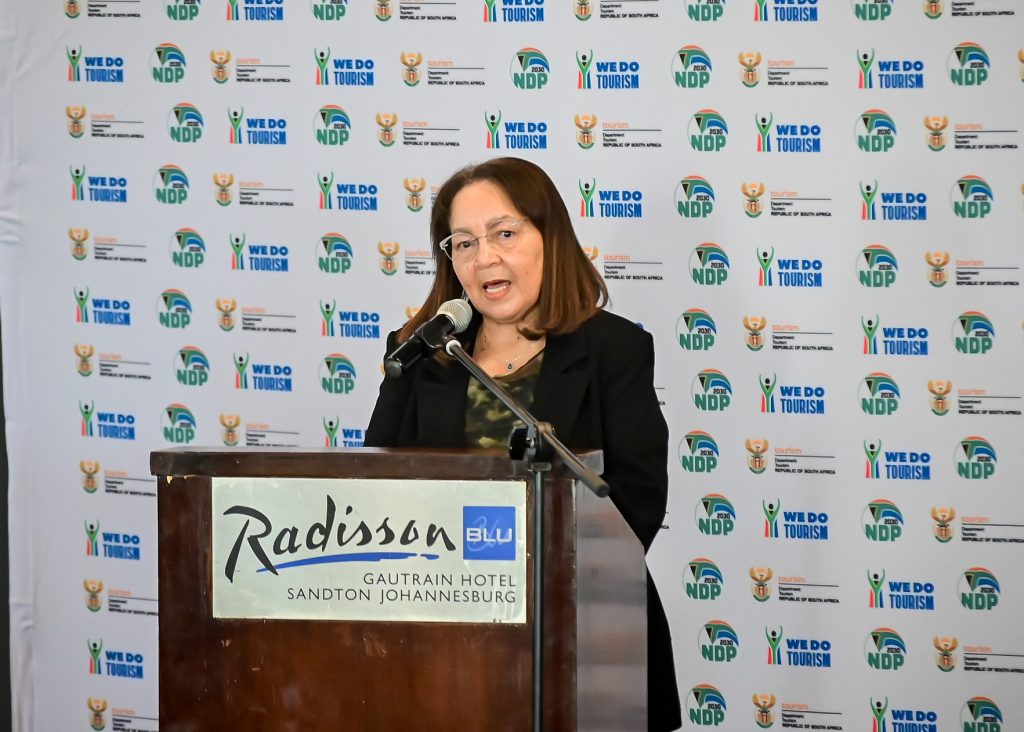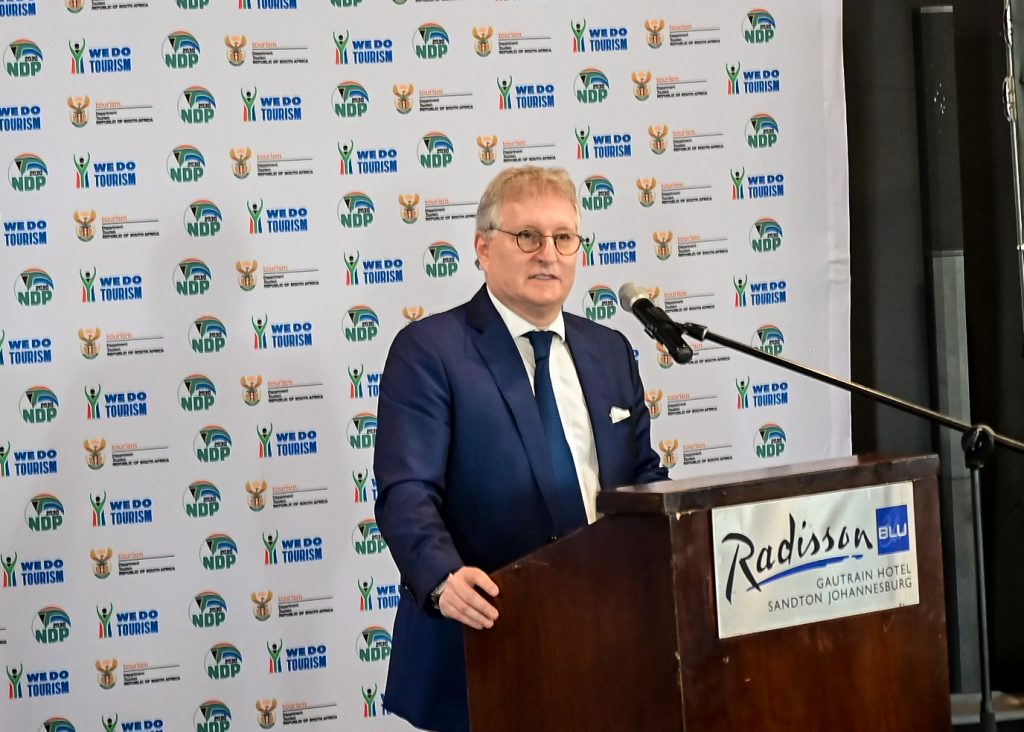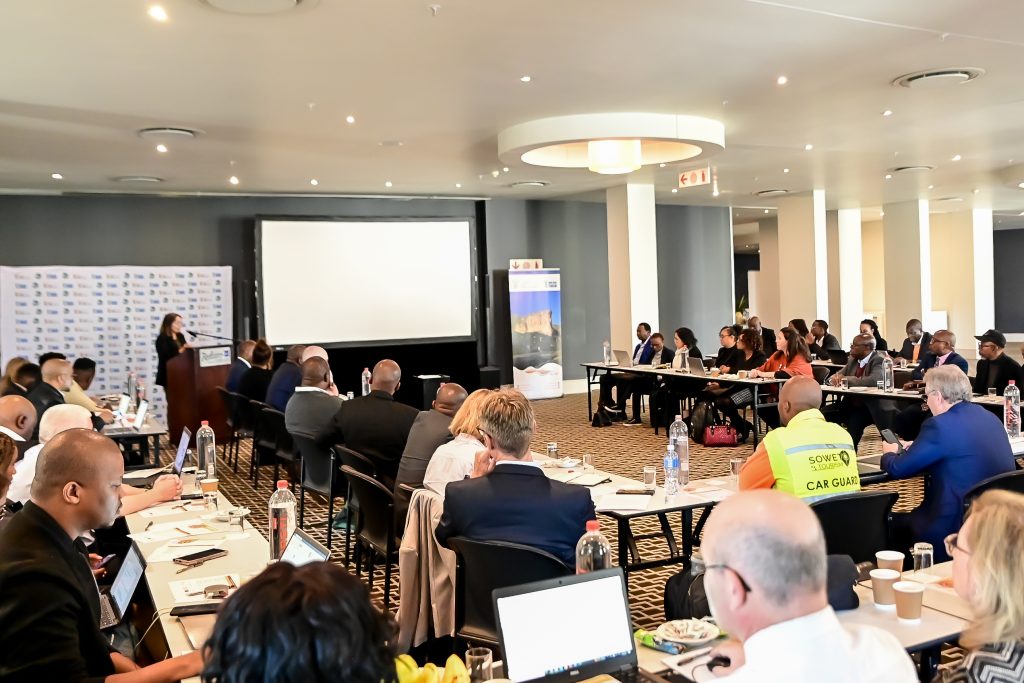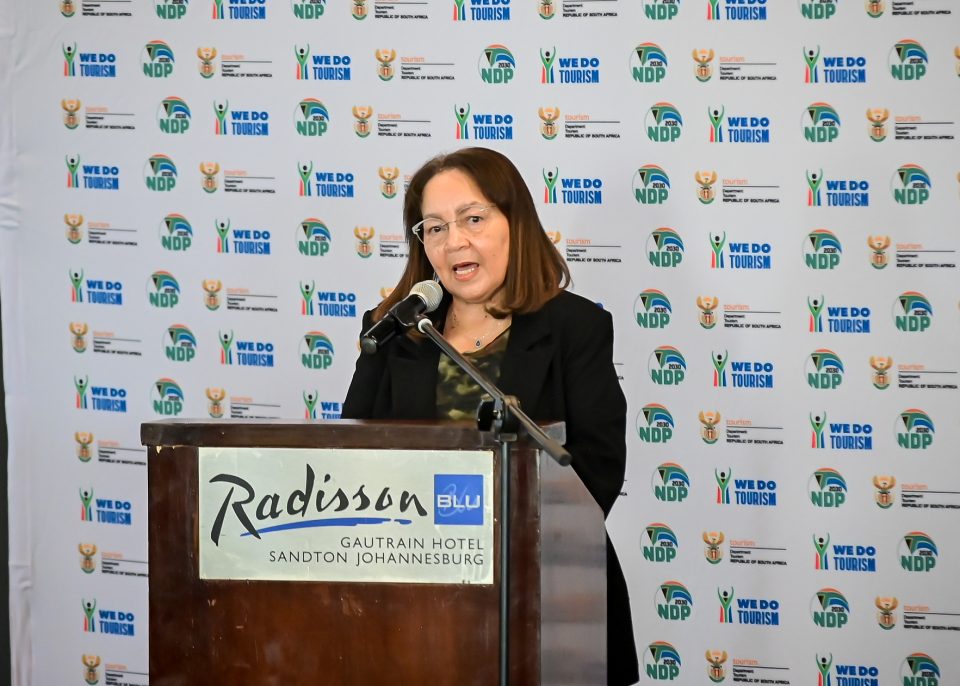
TODAY, I met with various stakeholders including MECs for Tourism, the South African Police Service, the private sector including the Tourism Business Council of South Africa (TBCSA) and the National Prosecuting Authority, to discuss tourism safety and actions that government in partnership with the private sector will take to enhance tourism safety.
Safety is one of the major issues affecting the tourism sector and as partners, government and the private sector, agreed tourism safety is a priority that we need to address collectively so that we can grow the sector and remove any obstacles standing in the way of that objective.
Tourism is not only an economic activity but an essential vehicle that promotes a mutual understanding between a tourist and host community. Tourism is recognised for its immense potential and its significant contribution to the economy.
An enhanced visitor experience takes into consideration the enhancement of local destinations sites through cleanliness, safety and security, access to information, as well as provision of quality services and an authentic experience.
Crime is a matter which affects tourism in many parts of the world and this has been echoed by several tourism ministers which I have engaged with from all over the world in recent weeks.
South Africa is no different and across the world, countries are grappling with these issues with instability and wars in some countries.
In my engagements with the private sector, we agreed that we need to confront safety and security issues head-on and implement actions to arrest the problem. We can only do so by working together.
I am pleased that after a detailed discussion today, we can report that the Department of Tourism, provincial departments, tourism associations and the private stakeholders have agreed that we will address Tourism Safety issues in partnership with one another.
Apart from the Tourism Business Council of South Africa (TBCSA), which represents several major tourist associations, stakeholders at today’s Tourism Safety Dialogue included FEDHASA, BARSA, SATOVITO and many other role players in the tourism sector.
We discussed the risks related to tourism and the strategies and actions that need to be implemented to improve tourism safety as agreed to in the 2018 Tourism Safety Strategy.
This strategy has, however, not been properly implemented due to the COVID 19 pandemic. But I am determined that together with our partners that we now need to address tourist safety with clear actions and timelines.

NATIONAL TOURISM SAFETY FORUM
In 2018, which was in the 5th administration, there was an agreement, established in all nine provinces, to set up the National Tourism Safety Forum. We are now in the 6th administration since 2019 and so the priorities of government must now be implemented.
The National Tourism Safety Forum’s (NTSF) responsibility is the co-ordination and integration of safety response mechanisms for tourists in distress.
Roles and responsibilities are clearly defined in the Terms of Reference.
THE NATIONAL TOURISM SAFETY STRATEGY
The objectives of the strategy are among others to:
· Set out the short, medium and long-term tourism safety priorities.
· Empower all spheres of government, tourism stakeholders, business/ private sector, tourism organisations and other relevant stakeholders to establish and coordinate a partnership-based approach to tourism safety and incident management initiatives;
· Set out roles and responsibilities of each sphere of government and other relevant stakeholders on the coordination of tourism safety programmes and ensure mutual support and cooperation between all stakeholders.
The strategy is divided into 3 key areas each with identified initiatives that are being implemented at both provincial and national level.
1. Proactive Measures
2. Responsive Measures
3. Aftercare Measures
The Key Objectives of the Action Plan are to:
· Increase visibility at identified tourist attractions and sites;
· Train Tourism Monitors to ensure that they are safe when executing duties; and
· Facilitate integrated implementation and support of safety programmes.
Key Focus Areas:
· Management, training and development of Tourism Monitors; institutionalisation of Tourist Safety;
· Case Management System (CMS),
· Database of crimes against tourists;
· Facilitation of cases relating to international tourist/s;
· Establishment of the Provincial Tourism Safety Forums;
· Call up for Police Reservists and Integrated Tourism Safety Awareness campaigns/ sessions.
IMPLEMENTATION
Management, Training and development of the Tourism Monitors
The Tourism Monitors Programme (TMP) is part of the broader government intervention that involves training, mentorship and deployment of unemployed youth in identified tourism attractions and sites.
The key objectives are: enhancing tourism safety awareness at key tourism attractions and sites, upskilling of unemployed youth and reducing tourist vulnerabilities.
The key performance areas of the appointed Tourism Monitors (TMs) include but not limited to: patrolling within the identified attractions and site/ areas, raising tourism awareness and provide information to tourists and report any crime incidents to SAPS and other relevant enforcement agencies.

SAPS Learning and Development Programme: This will be offered to Tourism Monitors and will include:
§ Crowd Management (Manage large crowd during local/ international events at deployed sites);
§ Legal Framework (Mandate; Human Rights; Specific relevant crimes);
§ Reporting (Duties of first responder (gathering information; basic interviewing skills; incident reporting and statement making);
§ Crime Prevention (Crime prevention concepts (e.g.) Security, Risk, Vulnerability; Crime displacement; Guarding; Patrols and Access control;
Facilitation of cases relating to international tourist/s:
The department has been in engagements with the National Prosecuting Authority (NPA) over the past two years to obtain guidance on ways to speed up cases involving international tourist given their limited time in the country once a crime has been committed.
At a workshop held in August 2022, the NPA informed the department that the President has accented to the legislation on the utilisation of the use of audio and visual link to present evidence in court.
This would entail the possibility of instituting Virtual Court proceedings, which would allow tourists to be part of the proceedings even if they had left the country before the conclusion of a case, and alternatively tourists could connect through audio-visual link at the South African Missions in their countries of origin.
Today, we have heard from the NPA today that amendments have, since, been made to the Criminal Procedure Act.
The Act has been amended to include Section 51 C, which incorporates a provision for witnesses to testify virtually. This section came into effect on 5 August 2022.
Establishment of the Provincial Tourism Safety Forums:
To date all the nine (9) provinces have safety forums or provincial structures where various stakeholders engage on issues related to tourist safety.
Call up for Police Reservists
In 2019, Department of Tourism together with SAPS funded the call-up for Police Reservist for Mpumalanga Province over the festive season
Post the 2019 call-up, the department together with SAPS national agreed that the matter and budgeting of the call-up for police reservists should be the responsibility of provinces.
In the past year, the Department has shared information with provinces on guidelines for the call-up for Police Reservists;
The guidelines covered the following:
o Identification and submission of hotspots by provinces;
o number of reservists required, and
o intended duration of deployment.
Tourism Safety Awareness campaigns/ sessions
The Department of Tourism has been conducting safety awareness sessions for over the past two financial years.
These sessions are meant to create awareness of the importance of tourism and tourists visiting the destination.
The sessions are being conducted jointly with the various safety and security structures. Some of the external stakeholders involved in these sessions are: Provincial Tourism Departments/ Entities and Security structures like Cross Border Road Transport Agency (CBRTA); Road Traffic Infringement Agency (RTIA); South African Police Services, Department of Home Affairs (DHA) etc.
The Tourism Monitors closer to the identified campaign sites are also brought in to be part of the awareness sessions.
INTERVENTIONS AND UPDATES
TOURISM MONITORS
Part of the National Safety Strategy is the deployment of Tourism Monitors by the Department of Tourism.
We are reviewing the training curriculum for tourism monitors, where they are recruited from and where they are deployed to in terms of identified hotspots and other medium to high crime areas.
The initial 2023/24 financial year Departmental budget is R174.5 million, to train 1 845 Tourism Monitors across the country.
I have however asked the department to increase the number of Tourism Monitors we deploy to 2 215 Tourism Monitors.
Today, I made a call on the various MECs to also make part of their EPWP budget available to fund the training of more Tourism Monitors.
The Tourism Monitors will be deployed to all provinces at top tourist attractions and national parks, especially high and medium risk areas.
We have consulted the private sector for their inputs into the training of the Tourism Monitors.
In the previous financial year, the Department trained more than 2 500 monitors in all provinces. The Tourism Monitors programme has come to an end and therefore there are no tourism monitors out there at the moment.
Since this programme derives its funding from the EPWP allocations, and knowing that all provinces also receive EPWP allocations, I appeal to the provinces to allocate some of the funding to the Tourism Monitors programme.
We have identified, in consultation with the private sector, 59 hotspots across the country. The deployment of Tourism Monitors will be prioritised to service these sites.
We must also work hand in hand with communities in tourist attraction areas for them to take ownership of their communities and understand the value and need to protect the tourist spaces around them. Communities must understand and be brought on board to help grow tourism in their areas.
MEMORANDUM OF UNDERSTANDING WITH SOUTH AFRICAN POLICE SERVICE
There is also a Memorandum of Understanding in place between the Department of Tourism and the South African Police Service that was signed in 2019 to work on various measures to enhance tourism safety.
TECHNOLOGY:
Another key intervention in Tourism Safety Strategy is the use of technology and specifically apps that can improve visitor safety and support.
For example, an app that tourists can download with all safety information and request specific types of help with the click of a button.
There are a number of APPs in the market that all are geared towards tourist safety.
The Department has been working with SAPS and has developed tourist safety tips which have a QR-code that allows tourists to scan the tips and have them electronically. The safety tips have also been incorporated into the MY-SAPS APP for easy access. SAPS indicated that they intend enhancing the features of its APP and are also looking at ways of creating more awareness about the APP.
It is the intention of the private sector to rollout a safety app called SECURA, which is solely dedicated to tourist safety nationally.
The app integrates affordable emergency medical responses, breakdowns and crime-related incident assistance.
It also includes SECURA’s panic button – which is accessible via mobile phone or in the form of a panic button on the app which connects travellers and tourism stakeholders to hundreds of emergency responders when every second counts.
These responders are ready and equipped to assist in any emergency situation.
The panic button on the app connects travellers and tourism stakeholders to over 200 private security companies and over 60 Emergency Medical Service providers.
How it Works
1. User activates Panic Button
2. Nearby Response providers notified and accept call out
3. Directed by Live GPS location
4. Incident Centre calls user to check emergency status and provide remote support
5. Traveller safety secured and Aftercare services initiated
Responders will arrive at the scene and stabilise the situation. In the case of EMS, they will transport the patient to the nearest most appropriate medical facility.
The private sector has defined timelines and are able to action the following: establish a Tourism Operations Centre under TBSCA to guide and manage implementation plan and deploy the SECURA Traveller technology to support Tourism Monitors and safety objectives from 1 July 2023.
The App is already in use and being marketed via SATSA at R49 per download / coupon valid for 30days – primarily to the Inbound Operators so that they may embed into their ticket sales.
The private sector is in the process of securing funds and they are confident of deployment by July.
Michael Tollman from the Tourism Business Council of South Africa said: “We intend to complete today’s conference with an agreed plan which will be implemented within the next 90 days.”
The plan will not only reduce risks to tourism safety and security, but it will also ensure that many more tourists return home from their visit to South Africa with a positive view to share with their friends, family and on social media.
In this way and with support from the National Department of Tourism, SA Tourism and the private sector we will have opportunities that we currently do not have in our toolbox to better sell South Africa and to improve and change perceptions of South Africa regarding tourism safety and security.
We do not expect perceptions to change overnight, but we are confident that if we can agree to the plan and measures being proposed today and we successfully implement them in the next three months, that we will see perceptions change over time and we will see great confidence and comfort for our tourists to travel in South Africa and to visit South Africa”.
TBCSA will work hand-in-hand with the Department of Tourism in strengthening the Tourism Monitors programme and bring resources together for this initiative.
CONCLUSION
Safety is a key concern for all of us and we need to confront these problems.
I made it clear to the Forum that I am looking for collaboration and ideas. More importantly, we need practical solutions. It’s the “HOW” that is important for me.
We need to, collectively, partner up to bolster tourism, with the common goal of giving visitors the best possible experience in this beautiful country of ours.
The road ahead is simple: we need to act and we need to act now.
I am clear that the mandate of SAPS to ensure the safety of all South Africans including our visitors but we can do more as partners within our ambit.
I share the concerns and need for urgency with the private sector. So this is my plea – let us work together to grow tourism and ensure the safety of both local and international tourists.
In everything we do, the best way for us to succeed is to take hands and work in partnership with the private sector.
Government has a role to play in terms of our respective mandates but the private sector are the business owners who know the sector the best. We need to find solutions together and we need to implement the solutions together.
I want to thank all representatives from government, the private sector and tourism associations for being part of the Tourism Safety Forum today and for your commitments and will to tackle this issue together.
We will continue meeting on a regular basis to refine the plans and report back on the commitments. We will also continue to brief the media and the public on the various safety measures in the coming weeks and months.
INFO SUPPLIED.


